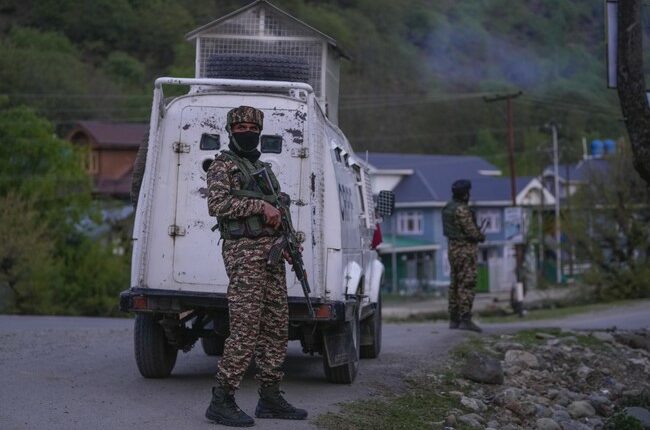
Pakistan, a nation frequently criticized for its dual role as both instigator and mediator in global security matters, is now on the verge of becoming a hub for blockchain transactions linked to jihadist funding, army and governmental manipulation, and political gain. The statistics are astonishing: As per official estimates from Pakistan, between 15 to 20 million citizens are currently engaged in trading crypto assets, positioning the country as the ninth largest globally in cryptocurrency adoption. However, beneath this apparent growth lies a more ominous reality.
Pakistan’s increasing involvement with cryptocurrency appears to be connected to some U.S. business ventures, some of which are affiliated with President Donald Trump’s family. It also represents a potential crisis on South Asia’s geopolitical chessboard, with global impact.
The timing and character of Pakistan’s recent shift toward cryptocurrency are telling. On April 26 (just days following a deadly terror incident in Pahalgam), India and Pakistan entered into an agreement with World Liberty Financial (WLF), a cryptocurrency firm with ties to Trump’s family. Eric Trump, Donald Jr., and his son-in-law Jared Kushner collectively own a 60% share.
WLF has introduced a stablecoin known as USD1, which operates on Binance’s blockchain. Binance was founded in 2017 by Changpeng Zhao, a U.S.-based Chinese developer. It is important to highlight that it is currently facing significant scrutiny from U.S. federal authorities and has been embroiled in money-laundering investigations. This very stable coin was utilized in a $2 billion investment transaction by MGX into Binance through WLF. Notably, MGX is an Emirati state-owned investment firm that was established by the Abu Dhabi government in 2024. His Highness Sheikh Tahnoon Bin Zayed Al Nahyan, the deputy ruler of Abu Dhabi, serves as the chairman of MGX. In straightforward terms, we are observing a geopolitical money-laundering scheme disguised as “financial innovation.”
The signing ceremony between the Pakistan Crypto Council (PCC) and WLF took place in Islamabad, attended by Pakistan’s minister for information, Ataullah Tarar, PCC CEO Bilal Bin Saeed, WLF Co-Chairman Zachary Witkoff, among others. The WLF delegation included Zachary Folkman, Chase Herro, and Witkoff, who is the son of Trump’s special envoy, Steve Witkoff, as stated by Pakistan’s Finance Ministry.
This situation transcends mere economic development. It represents a weaponization of financial technology. The striking optics of this deal, which included meetings with Pakistan’s Army Chief Gen. Asim Munir, Prime Minister Shahbaz Sharif, and various cabinet ministers, convey a powerful message about who stands to gain and who might bear the consequences.
Since 2021, media outlets linked to ISKP (Islamic State-Khorasan Province), including Al-Azaim and Nashir Pakistan, have actively sought crypto donations while urging supporters to fund jihad through Monero and other privacy-focused cryptocurrencies. The jihadist group Katibah al-Mahdi fi Bilad al-Arakan, based in Myanmar and associated with ISKP, reiterated this appeal in its May 2021 publication, “Arkan: Ahsan al-Qasas.” The increasing frequency of these solicitations indicates the existence of a complex, transnational financial network that is flourishing due to the crypto landscape that Pakistan is now endorsing.
The ramifications of the WLF and PCC agreement are significant. Firstly, Trump’s unexpected engagement in mediating the Kashmir conflict between India and Pakistan coincided with the WLF-PCC deal. This correlation raises concerns as Pakistan is the aggressor in the Kashmir conflict; the April 22 Pahalgam attack was committed by Pakistan-backed armed terrorists in Jammu and Kashmir, who murdered 26 civilians.
The Kashmir conflict, emboldened by Pakistan, is about expanding Islamic jihad and theocracy in South Asia. There is no colonialism on the part of India in Kashmir. The erstwhile ruler of Kashmir, Maharaja Hari Singh, at the time of Partition chose for his territory to become part of India, after armed tribal groups sent by Pakistan invaded to seize his land in 1947. Kashmir then legally acceded to India. Yet, Pakistan has continued to militarily occupy a portion of the state. Pakistan has since refused to comply with the requirements of United Nations Security Council Resolution 47 and withdraw its military forces from the state. Today, Pakistan continues to occupy 30,160 sq. miles of Kashmir, which is known as Pakistan Occupied Kashmir (PoK) and the Northern Areas or Gilgit-Baltistan. Moreover, Pakistan’s support or enablement of many Islamic terror groups in the region is well documented.
Secondly, by aligning with Pakistan’s cryptocurrency framework, U.S.-based businesses are inadvertently bolstering networks that have historically utilized Pakistani territory as a base for jihadist activities. The connection between WLF’s blockchain initiatives and terrorist financing mechanisms like Monero and Tether is well-documented. On February 12, Nashir Pakistan’s appeal for crypto contributions urged supporters to “do your part by contributing generously to jihad with wealth,” designating Monero as the preferred method.
To begin with, this crypto-financial corridor could soon evolve into an ungovernable digital black hole. The IMF is pressing Pakistan to incorporate cryptocurrency into its tax framework to address its escalating debt, while the Pakistan Crypto Council is advocating for formal legalization. Clearly, Islamabad has made its intentions known. However, regulation in Pakistan has a history of flexibility: often selectively enforced and frequently circumvented by the very bodies responsible for enforcing it. In this environment, the legalization of cryptocurrency does not signify a move towards modernization; rather, it paves the way for monetized militancy. Who can guarantee that Pakistan won’t eventually create a stealth Islamic stablecoin akin to their Islamic Nuclear Bomb in the future?
Moreover, there’s a parallel to Frankenstein’s monster: Just as the U.S. once supported Osama bin Laden during the Afghan conflict (only to witness that creation turn against its creator in the form of 9/11), the crypto framework in Pakistan could similarly backfire. Today’s blockchain wallets might become tomorrow’s bomb-making tools. The pro-ISIS media outlet Nashir Pakistan has already issued threats against the Paris Olympics and the T20 World Cup, calling for assaults financed by anonymous crypto contributions. This unholy alliance of state actors, crypto magnates, and jihadist factions forms a dystopian trifecta; it is business stained with blood.
Simultaneously, if the U.S. government aids Pakistan in its quest to dominate the crypto landscape to counter India’s rising influence in the global south and dismantle India’s alternative digital payment systems like UPI and RuPay, this might lead to America’s own downfall in the future.
In conclusion, Pakistan’s increasing involvement with cryptocurrency transcends mere digital finance. It represents a strategic geopolitical play that threatens India, global stability, and the very fabric of American democratic values. By allowing Pakistan, a state with ties to terrorism, to evolve into a crypto centre, Washington risks creating another uncontrollable entity. This time, however, the creature is woven into blockchain technology, shrouded in Monero, and fuelled by ideology.
And if history has taught us anything, it is that nurturing a monster for profit only guarantees that it becomes too formidable to manage. As the world gazes into this digital chasm, one can only wish it will not reverberate with the echoes of another 9/11.
Editor’s Note: The mainstream media continues to deflect, gaslight, spin, and lie.
Help us continue exposing their grift by reading news you can trust. Join PJ Media VIP and use promo code FIGHT to get 60% off your membership.







